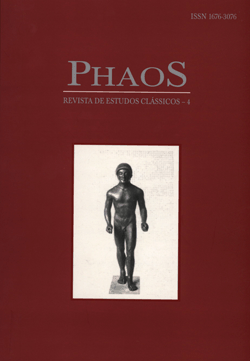Tempus em Sêneca: abordagem de um conceito-chave
Palavras-chave:
Seneca. Tempus. Uita. Stoicism. Philosophy.Resumo
The concept of tempus is present in a great part of Seneca's work, being the "main axis around which everything else moves" (Goldschmidt). The philosopher's analysis of time has a moral scope: tempus, for him, is that time which is lived out in the anguish of the fleeting moment. We present here a selection, translation and comment of pieces from Seneca's epistles, focusing on the issue of temporality in the stoic philosopher. We employ, as a starting point, an anthology of texts that was organized by Alfonso Traina. The comments on the translation develops some grammatical and stylistic aspects, as well as intertextual references to the respective works. Such considerations have been taken into account, in our study, aiming at a better understanding of the concepts and nuances that can be associated with tempus in Seneca's writings.Referências
I - Obras de referência:
GLARE, P. G. W. (ed.). Oxford Latin Dictionary. New York: Oxford University Press, 1982.
SARAIVA, F. R. S. Novíssimo dicionário latino-português. Rio de Janeiro: Livraria Gamier, s.d.
II - Autores antigos:
SÉNEQUE, L. A. Dialogues (t. IV). Texte établi et traduit par René Waltz. Paris: Les Belles Lettres, 1950.
SÉNEQUE, L. A. Dialogues (t. III). Texte établi et traduit par A. Bourgery. Paris: Les Belles Lettres, 1955.
SÉNEQUE, L. A. Lettres a Lucilius. Texte établi par François Préchac et traduit par Henri Noblot. Paris: Les Belles Lettres, 1987.
III - Estudos:
ALBERTINI, E. La composition dans les ouvrages philosophiques de Séneque. Paris: E. de Boccard, 1923.
ARMISEN-MARCHETTI, M. Sapientiae facies. Études sur les images de Séneque. Paris: Les Belles Lettres, 1989.
BENVENISTE, É. "Latin 'tempus". In Mélanges de Philosophie, de Littérature et d'Histoire anciennes offerts à Alfred Emout. Paris: Klincksieck, 1940, p. 11-16.
BRAREN, I. "O valor do tempo (Sêneca, Epístolas morais a Lucílio, 'Epístola 1')". Letras Clássicas, n. 3, 1999, p. 291s.
CONTE, G. B. Latin literature: ahistory. Baltimore/London:Johns Hopkins University Press, 1994.
CONTE, G. B. The rhetoric of imitation, with a foreword by Charles Segall. Ithaca, New York: Comell University Press, 1996.
GOLDSCHMIDT, V. Le systeme stoi"cien et l'idée du temps. Paris:]. Vrin, 1977. GRIMAL, P. La vie à Rome dans l'antiquité. Paris: Université de France, 1960. ___ o Séneque: sa vie, son ceuvre, avec un exposé de sa philosophie. Paris: Presses Universitaires de France, 1966.
GOLDSCHMIDT, V. "Place et rôle du temps dans Ia philosophie de Séneque". Revue des Études Anciennes, 1968, p. 92-109.
JONES, P. & SIDWELL, K. The world of Rome: an introduction to Roman culture. New York: Cambridge University Press, 1997.
LÓPEZ-KINDLER, A. Función y estructura de Ia sententia en la prosa de Seneca. Pamplona: Universidad de Navarra, 1966.
MOREAU, ]. "Séneque et le prix du temps". Bulletin de l'Association Guillaume Budé, 1969, p. 119- 124.
NOVAK, M. G. "Estoicismo e epicurismo em Roma". Letras Clássicas, n. 3, 1999, p. 257- 273.
PEREIRA, M. H. R. Estudos de história da cultura clássica (voI. 11). Lisboa: Fundação Calouste Gulbenkian, 1990.
SEGURADO E CAMPOS, J. A. Cartas a Lucílio. Lisboa: Fundação Calouste Gulbenkian, 1991.
TRAINA, A. "11 tempo e Ia saggezza". In: Seneca. La brevità della vita. Torino: Loescher Editore, 1996.
VEYNE, P. (org.) História da vida privada (voI. I). São Paulo: Cia. das Letras, 1997.
ZAMBRANO, M. El pensamiento vivo de Séneca. Madrid: Ediciones Siruela, 1994.
Downloads
Publicado
Edição
Seção
Licença
Ao se submeterem textos para a PhaoS, seus autores devem estar cientes de que, se aprovados para publicação, a revista terá sobre eles todos os direitos autorais pertinentes. Originais não serão devolvidos.

